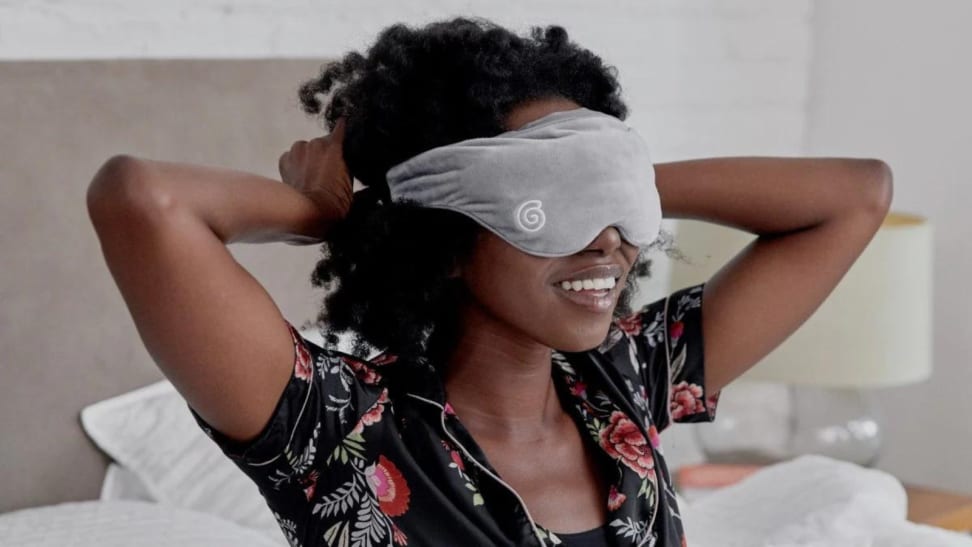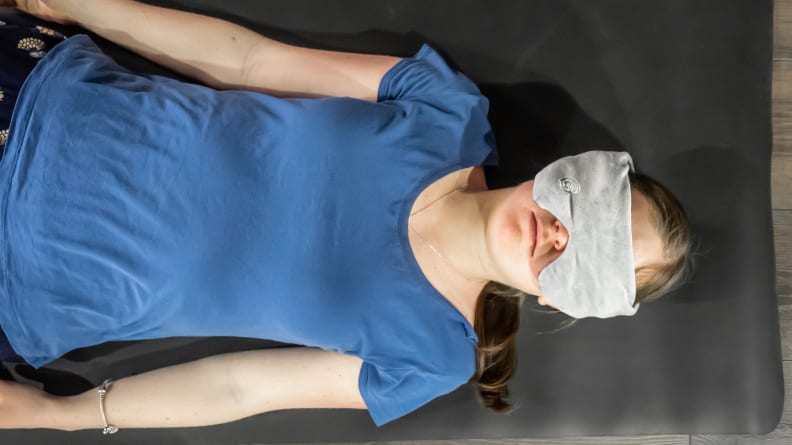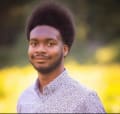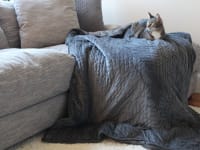Are weighted eye masks safe to sleep with?
They might be better suited to meditation than getting some shuteye.
 Credit:
Gravity
Credit:
Gravity
Products are chosen independently by our editors. Purchases made through our links may earn us a commission.
Sleep Week 2024 is here and it is all about improving your sleep so you can hop out of bed rested, recharged, and ready to take on the world. Light can play a big part in how much sleep we’re getting; even if you plan to sleep for eight hours, sleeping in a bright room will put the kibosh to that.
One solution is to hang up blackout curtains, yet they can be pricier and they’re not portable. Sleep masks are a more versatile solution and in the past few years, weighted sleep masks such as the Gravity Weighted Sleep Mask have gained traction as a way to increase relaxation while blocking out light.
However, having extra pressure on your eyes may not be exactly risk-free. We spoke with healthcare professionals about the upsides and downsides of using this type of eye mask while you sleep so you can determine if weighted sleep masks are right for you.
What are weighted eye masks and what do they claim to do?
Weighted eye masks have become a trendy sleep product that claim to help soothe anxiety and allow people to nod off faster. The masks, which weigh anywhere from a quarter pound to a pound, are also promoted for meditation, yoga, and travel. Many different weighted masks are available online, and numerous customers attest to their relaxation benefits. Some popular ones are manufactured by companies that also make weighted blankets, like the aforementioned Gravity and Nodpod.
Some masks advertise pressure on a user’s eyes, while others insist the weight is felt only on the areas around the eyes.
Gravity, the company that makes our favorite weighted blanket, offers plush masks that weigh up to a pound. The company says the masks put weight on pressure points around the eyes to increase relaxation. Gravity’s weighted eye mask is stitched so that the weighted beads inside aren’t directly over a user’s eyes, though we found that the mask doesn't fit tightly to a user’s face, so if you roll at night, it easily shifts around. Several customers on Amazon also report that the mask still puts pressure on their eyes.
Are there any risks associated with weighted eye masks for healthy individuals?
There isn’t a lot of good data on the impact of weighted eye masks on eyes, says Dr. Andrea Tooley, an ophthalmic plastic and reconstructive surgeon and spokesperson for the American Academy of Ophthalmology. But eyes are very delicate and sensitive, she adds.
For example, to maintain appropriate lubrication, eyes are constantly producing tears. At night, tear production slows, but your eyelids move those secretions across the surface of your eye to keep it lubricated. If there’s too much pressure on your eyes, it could interfere in that natural process and lead to dry eyes, says Tooley.
There are also some practical concerns with weighted masks, depending on your sleep habits and favored position. Wearing a weighted mask could also be disruptive to your sleep in general if the mask moves while you toss and turn, or you’re a stomach or side sleeper and you can feel the mask dig in due to the pressure of your head position on your pillow. These were issues that our testers experienced in trying out the Gravity Sleep Mask.
Are some people more at risk than others?
Yes. People with glaucoma should not put weight on their eyes because the weight can increase pressure inside the eyes. “This [pressure] can potentially damage the optic nerve causing progression of diseases of the optic nerve like glaucoma,” explains Janet Aug, an optometrist at Cheshire Medical Center in Keene, New Hampshire.
People who are going in for eye surgery and those that have recently had surgery should also avoid weighted masks. Extra pressure on the eyes could change the shape of a person’s cornea, which is a problem if surgical prep has already been set for specific eye measurements, says Tooley. Weight on the eyes after surgery runs a risk of interfering with the healing process of any incisions in the eyes.
It’s a good idea for anyone to visit a doctor before using a weighted sleep mask, because some eye conditions are not seen or felt by a patient and are only discovered during a dilated eye exam.
Are there any benefits to using weighted eye masks?

There isn’t enough scientific evidence to say whether weighted masks improve sleep.
There is no scientific evidence supporting the idea that weighted eye masks improve sleep. However, the weight of a mask can theoretically stimulate the vagus nerve, says Aug, which can make you feel relaxed and tired. This may make them suited for yoga or meditation before bed.
“Based on my clinical experience, I don't think weighted eye masks are for everyone, but they may benefit some people,” says Yishan Xu, PhD, a sleep specialist at Mind & Body Garden Psychology Inc. in Los Altos, CA. The darkness created by the weighted eye masks can help users fall asleep, she says, adding that some people find weighted eye masks relaxing, but this has to be determined by personal preference because of the lack of research.
Should you try a weighted eye mask?
Sleep and mental health are important, so if you feel that weighted eye masks are helpful, then you have to weigh the risks and benefits, says Tooley. Still, she suggests using the masks for meditation, after yoga, for a nap, or before falling asleep to wind down, rather than sleeping in a weighted eye mask all night. She said she would not recommend using them for “prolonged, overnight exposure.”
“The longer the pressure is on the eyes, the greater the potential risks, so overnight use could be more risky than short term use,” adds Aug.
What else can I use to relax at night?

Using weighted blankets to feel calmer is backed by research and they’re safe to use for sleeping.
If light is the issue, weighted eye masks aren’t your only option for a blackout sleep experience. The safest type of sleep mask is those with contours that prevent pressure on your eyes, says Tooley, though it’s important to keep any sleep mask clean to avoid potential eye infections. The best sleep mask we’ve tested is the Mzoo Sleep Eye Mask, which is contoured to create a bubble over your eyeballs so they feel no pressure at all, while providing a full blackout experience.
If you like the idea of weight on yourself, you can try giving your whole body a hug with a weighted blanket. There is evidence supporting weighted blankets for relaxation, Xu says, but it’s not clear if they improve sleep. If you want to give it a shot, at least you can do so knowing a blanket won’t adversely impact your eyes. Here at Reviewed, we love Gravity’s weighted blankets and also recommend Baloo Living for a high-quality weighted blanket if you prefer cotton to synthetic materials.
Sound machines or earplugs could be useful methods for feeling calmer at night, suggests Xu, because they block out stimulating noises that might keep you up or rouse you mid-sleep.
Additionally, integrating meditation into your evening routine may relax you before bed.
What if I really want to sleep in a weighted eye mask?

Experts we spoke with suggested using weighted masks for meditation rather than sleeping in them overnight.
If you still want to try a weighted eye mask overnight, Aug recommends scheduling a check-up with an ophthalmologist to make sure you aren’t at risk for any eye problems that could be exacerbated by such a mask.
Some weighted eye masks, such as the highly rated Yfong Sleep Mask, are contoured to provide space directly over your eyes. This is intended to prevent weight on the actual eyes while still creating pressure on your face. Yfong’s mask weighs just over a quarter pound, but customers say it provides the weight they crave while keeping their eyes safe.
“The weight of it is really nice,” writes one customer who gave it 5 stars. “It’s weighted only in the areas you would want the weight—sinus areas, headache areas, temples.”
Sleep mask company Manta also offers a weighted mask. Although the company says it puts zero pressure on eyes, it advertises the mask as most comfortable for back sleepers (which, based on our experience with the non-weighted Manta Pro sleep mask, we’d agree to steer clear if you’re a side or stomach sleeper).



